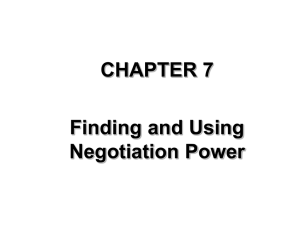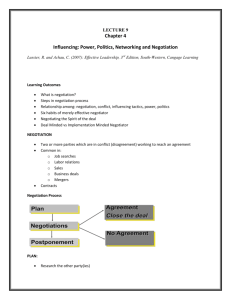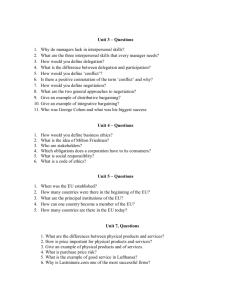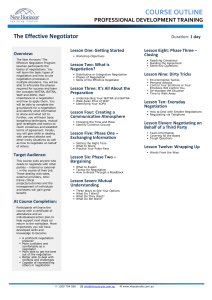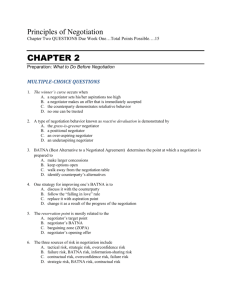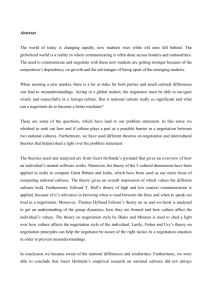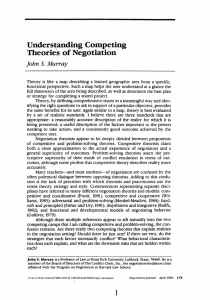Negotiating Skills Presentation
advertisement
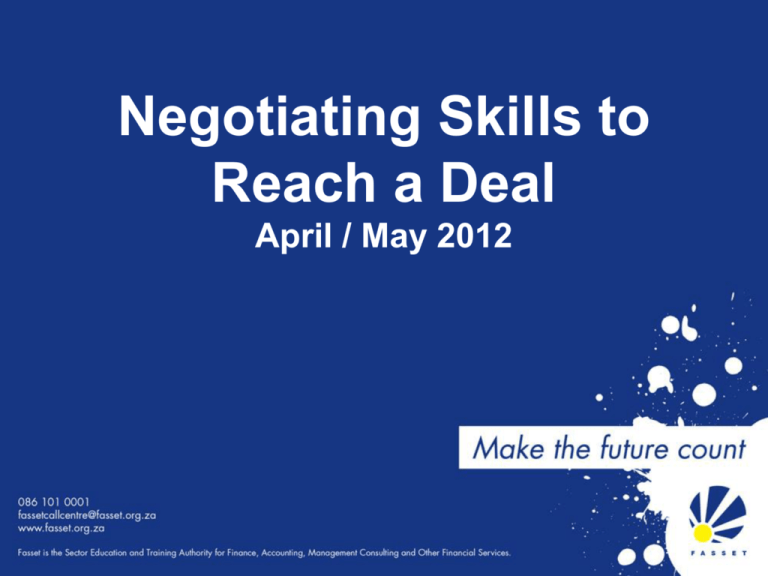
Negotiating Skills to Reach a Deal April / May 2012 Introduction to Negotiation Introduction to Negotiation • How would you define negotiation? • What other words do you associate with negotiation? • Terminology used in negotiations Individual Exercise What scenario do you want to focus on? Who is involved? Individual Exercise Describe the current situation? What are you willing to give in order to get? Individual Exercise Issues Outcomes Realistic Acceptable Worst possible Interpersonal Skills Interpersonal Skills Interpersonal skills require that we are aware of our behaviour and of our counterparts in the negotiations. The four basic styles of behaviour gives an indication of how people react and respond to situations Interpersonal Skills No one style is superior to the other style, and no one person can be all four styles. To improve your negotiation, know who and how to deal with the various people, and who you are. Interpersonal Styles Driver (Action) Analytical (Process) Expressive (Idea) Amiable (People) Interpersonal Skills • Avoider: dislikes conflict • Compromiser: fair-minded people interested in maintaining relationships • Accommodator: resolve interpersonal conflicts by resolving the other person’s problem • Competitor: winning is the main thing • Problem-Solver: seeks to find the underlying problem, use brainstorming to solve Interpersonal Skills • You are one of ten people at a conference table, each person sitting across from one another • Someone comes in the room and says “I will give R1,000 to the first person who can persuade the person sitting across from them to come and stand behind his/her chair.” Interpersonal Skills Results • Avoider: says I don’t want to play, look foolish • Compromiser: both offering R500, starts running to other side • Accommodator: runs to other side, negotiates later • Competitor: sits tight, demands other person move • Problem-Solver: “let’s both get behind each others chairs, we can each make R1,000.” What Makes a Good Negotiator? Group Activity You have 10 minutes within your small group of three to brainstorm a list of the 10 key skills that successful negotiators need. List your key skills and note the reason why each of your ten skills is crucial to you as a negotiator. Group Activity Key Skills Reasons 1 1 2 2 3 3 4 4 5 5 Negotiator’s Ratings Planning skills Thinking Under Stress Integrity Verbal clarity General Practical Sense Negotiator’s Ratings Ability to gain respect Ability to exploit power Team Leadersh ip skills Tact Open mind Negotiator’s Ratings Professional standards Product Knowledge Self Confidence Persistence Insight Individual Exercise List all your personal strengths as a negotiator? List your personal areas for development? How good a negotiator are you? (p21) Results 20 - 40 - You are not a successful negotiator 40 - 60 - You have some ability in negotiation 60 - 80 - You are a good negotiator 80 - 100 - You are an excellent negotiator Body Language Body Language Body Language Body Language Body Language Steps of Negotiation Planning • Negotiators with high aspirations consistently outperform those with low aspirations. • By adopting a high aspiration base, negotiators create sufficient room to make and request the necessary concessions. • High aspirations generate positive psychological energy and prevent a negotiator from being rigid and defensive. Planning • A high aspiration communicates confidence to the other party and generally prevents irrational negotiation behaviour. • High aspirations require the other negotiating party to expend more energy in trying to lower these aspirations, thus not focusing on promoting its own aspiration. Planning What is the reason? What are the topics to be discussed? What is my perception of the issues? That of the opposer? What resources can I draw on? Planning What do I know about my opposer? What do I know about the person he represents? What are the negotiating style of the other party? What are my interests? Planning What are the interests of the other side? What are our common interests? What are the opposing interests? What standards to use to resolve conflicting ideas? Planning Low vs High Why is the other side talking to me? Why do they need something from me? What prevents them from doing it another way? Setting Goals and Objectives S • Specific M • Measurable A • Achievable C • Challenging C • Compatible Opening Position Opening Position Outline Your Opening Position Decide on Low Ball Decide on High Ball Opening Position This Position is Realistic Confirm all Agreements Perception of Power Opening Position - Agenda Number Issue Sequence Priority Priority Negotiator Opposer Bargaining Bargaining Define your range Start Target Walkaway BATNA: your alternatives Agreement and Close • Put pen to paper and agree on the way forward Questioning Techniques • An OPEN question is one that encourages a full response • A CLOSED question is one that can be answered with a short answer Questioning Techniques Practical Session Ethical Negotiation • INDIVIDUAL EXERCISE - A question of ETHICS • Decide whether or not the approach would be appropriate p42 - (the deal is important to you) Influencing Techniques Practical Role Play Pg 45 The Ugli Orange Tactics • • • • • Competitive Tactics Avoidance Tactics Compromising Tactics Collaborative Tactics Accommodating Tactics Tactics Negotiation Gambit Good Cop/Bad Cop Cherry Picking Walking Away Split the Difference Flinch Description How to Overcome it Closing Techniques • • • • • Concession close Summary close Adjournment close “Or Else” close Either or close
